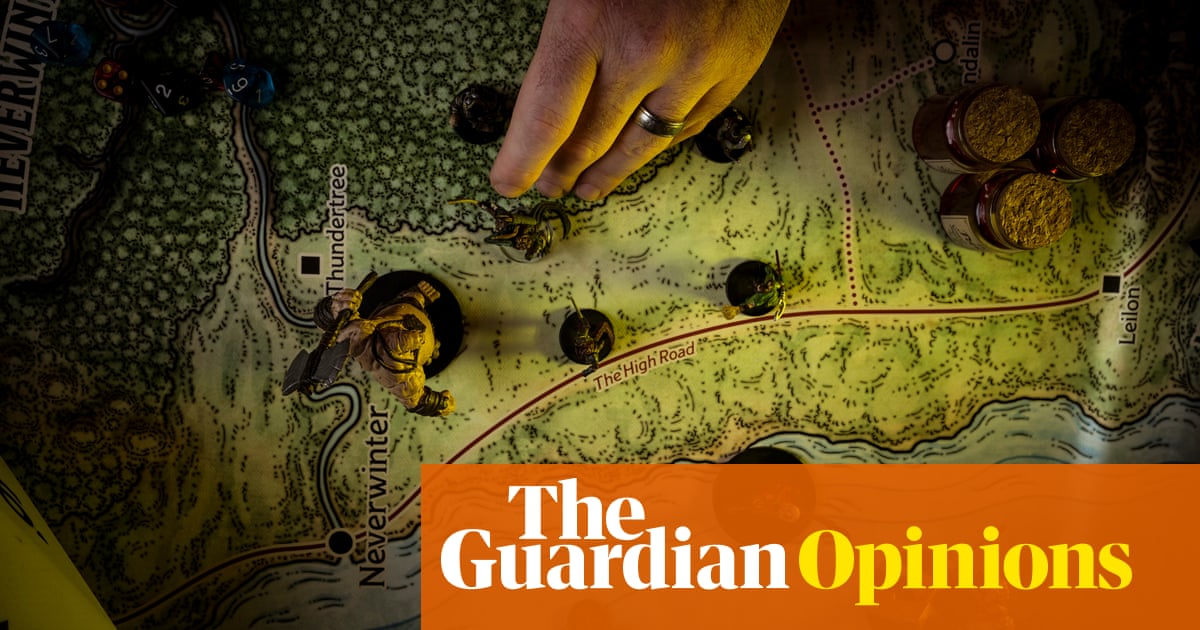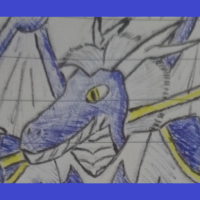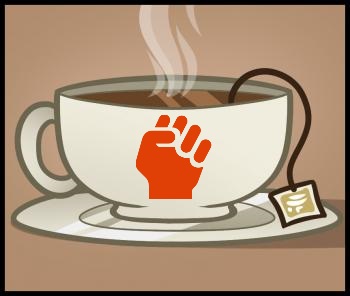I mean, even as a DnD player, I appreciate that you DO need to turn a profit as a company, and I enjoy my favourite hobby getting wider attention. I’m actually not opposed to them making this into a bigger franchise because I think that it IS suitable to fill that sort of Marvel role, contrary to the article. It has clearly defined heroes and villains, iconic designs, and very flexible storytelling, all of which CAN be compared to a more mature Marvel. Making a handful of recognisible heroes and villains and promoting them honestly seems like a perfectly sensible and legitimate business tactic.
HOWEVER.
As a DnD player, I also actively dislike the story design in most official content because it’s painfully generic. Everything is made to be very comfortably within the realm of mass appeal and staying within the realms of conventional fantasy. They have unspoken rules and tropes that they simply Do Not Violate and as a result they struggle to craft stories that aren’t predictable. They are noticeably complete shit at having any idea how to make a force for good that’s more powerful than the players that isn’t used as a punching bag to make the players feel like they’re in danger. And my point is that they COULD and should take more risks when doing storywriting and character design, because the nature of DnD is that even if you totally fuck something up, because everyone runs their own worlds a retcon isn’t going to destroy everything- and more than that, writing out a story, while time-consuming and requiring effort, is nowhere near the money sink that a movie is. It’s fine to take risks! Defying conventions is OK! It’s completely fine if not everyone likes each product, so long as it’s well-made on the whole!
Otherwise the game is also super unbalanced (I know this because I have extremely extensively created homebrew for it, I can tell you EXACTLY how and where it is unbalanced), although this isn’t as bad as it would be in a lot of other games because you won’t really notice the balance issues if you’re just playing a casual game with your friends. If one of your friends is trying to play the game optimally though, then they can rapidly make the game unplayable by taking advantage of especially unbalanced parts of the game.
And this is to say nothing of the fact that the absolute greatest strength of DnD is the fact that players can do whatever they want. So trying to make stuff that tells players they need to act a certain way is only going to diminish that strength.
The concept of a well-balanced DnD really bothers me. I do not think balance should be a core design goal. The Wish spell is horribly unbalanced, and should be. I think its representation of endless possibilities and horrifying consequences is emblematic of the spirit of the game itself, rooted in the olden days of DnD, when the DM was really doing his absolute best to TPK his party in a more competitive, adversarial, board-game-esque setup.
The lack of balance in the older versions of the game had benefits. A player who wished less engagement with the game mechanics could play a fighter, where someone who wanted a larger amount could play a wizard.
Balance in and of itself is not a problem, but unless done very carefully with a lot of attention paid to how that balance is arrived at, it’s just too easy to make everything feel very samey. Like a video game that becomes so well balanced that the awesome laser rifle is a perfectly balanced option against some other guys bow and arrow, making it all start to feel hollow and soulless. Like a fighting game that does not acknowledge that Green Arrow and Wonder Woman really aren’t actually in the same league, to be able to fairly fight each other in an immersive way.
Starcraft and Helldivers 2 managed to arrive at a degree of balance that still feels wholesome and maintains distinction, but they’re very much the exceptions to the rule. It’s such a difficult thing that the vast majority of times its attempted, it results in some sort of failure. Personally, I prefer a different route, where devs simply embrace the inherent imbalance, and allow people to do broken-ass things that might be fun, and allow other options to exist that are just plain bad. I see nothing wrong with this outside of competitive, pvp style genres.
While you make fundamentally good points, I think there is a core reason that balance is important to me: DnD is a multiplayer game, not a singleplayer game.
I actually think it’s fine that different classes are strong at different levels! The entire premise of Wizard is that they’re a squishy who will die if they’re sneezed on at level 1, who grows into a reality-warping god by level 20. Having someone that needs to be looked after at low levels and can then look after the team at high levels encourages teamwork!
The reason that I say DnD is so badly unbalanced is because once level 5 comes around? Casters very, VERY firmly become way better than non-casters for two reasons. Casters have AoE damage, and casters have utility. Non-casters have no utility, and because they also really struggle to increase AC, they can’t function in any role except for single-target damage. A good level 5 caster can make the rest of the party feel really lackluster because they can do in one turn what the rest of the party needs 4 or 5 turns to do (HP and AC are much less of an issue at this point too). And this gap only gets wider and wider with every passing level, which rapidly makes it less and less fun to play a non-caster.
Once level 13 hits, anyone who isn’t a full caster is completely irrelevant. That is not fun for anyone who isn’t a full caster. Hell, it’s SO badly broken at this level that it’s almost certainly the reason why Baldur’s Gate 3 only goes up to level 12- and that game already does a huge amount of buffing martials and nerfing casters. A 13th level caster can instantly beat pretty much any encounter not explicitly designed to bully them, and even then there’s a good chance they find a way to solo the encounter on turn 1 anyways.
At that point, games need to have more frequent encounters without rest to deplete casters’ limited resources.
But ultimately I prefer PF2E. I had a blast playing a martial monk taking a variety of actions every round, vs “attack” and “attack again”.
Yes, I play a higher-level wizard who is always running out of spell slots by the end of the dungeon, casting wimpy cantrips and hiding behind the martials. As nature intended.
It’s all about the DM saying no to long-resting whenever and wherever. It may seem like common sense that the players should be able to say when the party should rest. But the game doesn’t work, especially at high levels, unless the DM controls and limits them.
Very true. I simply see that as a pro, and not a con, and put the onus to address the core problem of some players potentially feeling bad on the DM’s shoulders, with creative solutions. I understand that is asking a whole hell of a lot, but I think its worth it.
One thing old school DnD did to address it was to give martials leadership mechanics. While the wizard could destroy an army if he wanted, he lacked mechanics for assembling and leading one well, which were given to a fighter.
All that balance does in a pen and paper game is provide predictability for the GM. “If I hit them with X, it will take Y to overcome it using A,B, and C”. That only leads to homogenization if the GM doesn’t do anything meaningful with that knowledge.
Way, way too many people view this shit as “demands from the designer” rather than “tools to use for your convenience,” and I super don’t get it. If you want some of the players to outshine others, you can predictably boost their power level if the game is balanced.
But I guess just flexing on friends is what many people really want out of the game.
WotC have been bouyed by the fact Magic: Universes Beyond has turned a quick buck, at the expense of longevity (turning mtg from a unique game to just a game mechanism to shill pop culture IP).
WotC is going through it’s enshittification stage… ruled by executive bean counters, not passionate creatives…
Producing content you don’t like isn’t remotely close to “enshittification”.
Producing content entirely to gather attention in the hopes of boosting sales is exactly that
That’s literally been their business model since the beginning, it just used to be that the content was Umezawa’s Jitte or Chrome Mox and now it’s Gandalf or Doctor Who.
The real pack sellers are power creeped cards, not the IP of that set.
It really isn’t. What you’ve described is every business plan ever, not psuedo-rent seeking or lessening the product for profit. You not liking their new choices is a personal problem, not an issue with the company.
There seems to be a lot of attention on WotC actions, so I guess people are concerned that it might work to turn D&D in this dreaded “lifestyle brand?” Statements like the “it won’t work” in the title serve to convince yourself then.
I don’t care about WotC. There is no threat to anything I’m playing. If they destroy the D&D brand, so be it.
Could it still affect me negatively? Maybe indirectly. If D&D blows up, then RPG community probably shrinks and fewer people join. The most popular game is the entry game for many after all. So it will hurt the many small indie creatives too. Maybe there will be a painful correction. On the other hand, it probably results in a more healthy and resilient community afterwards. Still, I would feel sorry for the people who live on a small RPG business now which might not survive a D&D implosion.
DnD is very much NOT holding role playing together. I have no idea why people fear corporations going out of business… You can still make characters and roll dice or play MTG if the entire company goes bust!
This fear is nothing but complete ignorance and the basic fear of change. Almost as silly as thinking PC’s would die if Microsoft tanked tomorrow…
If they somehow kill D&D, Pathfinder will just take its place again.
I just left the system tbh and bought Pathfinder 2 stuff instead. WotC is not to be trusted (anymore) sadly.
I found Changeling: the Dreaming and have never looked back.
Thx I love checking out new stuff
After all the OGL drama I considered going to PF2 also, but after a little research decided if I was going to take the time to learn a new system and embrace crunch, I might as well go all the way and landed on GURPS. Got rid of all my 5e stuff and haven’t looked back
Same. Also a bunch of Powered by the Apocalypse systems.
They tried to make Magic the Gathering into some kind of big brand with characters and merch and corporate fuckery- they drove people away, myself and my friends included.
I don’t see this going much better.
Have they sicced the pinkertons on anyone yet? Maybe a negative reviewer?
It has merchandised in the past with some success.
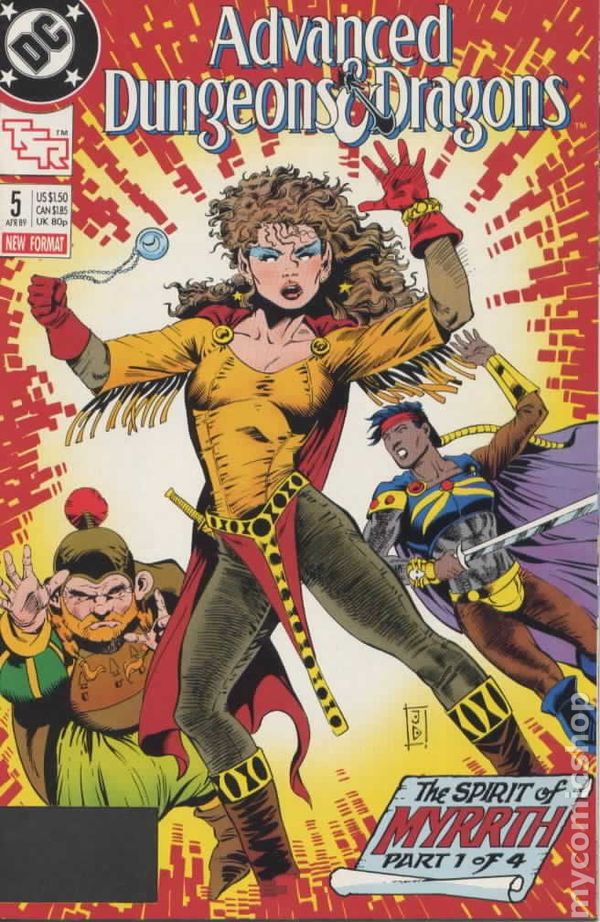
Back when TSR was sold out from under Gygax’s clutch, Lorraine Williams tried some similar marketing, there was a beach towel with Dungeons and Dragons’ red dragon in this design:
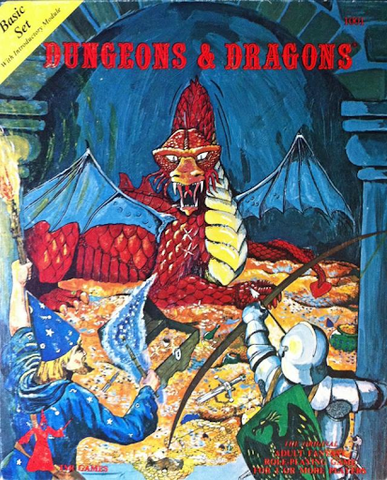
Only as I recall it, the lettering and dragon were pink. I have never seen it posted online, and I didn’t buy one*. I don’t know that many sold.
*Of course there was this whole Satanic Panic back then, and why would anyone want to advertise they played D&D at a pool where likely everyone would have given you a bunch of crap for playing “the Devil’s game”?
After seeing Forbes write about D&D on multiple occasions, years of RPGs in video games, 50 years of RPGs being in society, a successful movie, and absurdity of the 80s situation gone, it could work now.
That DC cover immediately sent me to 90s X-Men in space stories.
i mean these days you don’t really need to buy the books to play- you can learn how to play from an Actual Play, reference the rules in a VTT, and have your DM learn from a youtuber. that really leaves WotC either in the business of making solid modules and supplements, or just making knick knacks- and they’ve clearly chosen the latter, at least until they can force whatever subscription model they can on the exclusive VTT they’ll have for 6e
Not to mention the basic rules are just available online for free via the SRD. They don’t contain any lore, flair, or images. It’s strictly the rules of the game.
Most folks never did need the books to learn to play. You’ve always been able to learn D&D by somebody (usually their DM) explaining it. But many people end up buying books and things once they’re engaged.
Like any hobby, people spend money on it when they want to. Those solid modules and supplements you mention would be a bit part of that, but also how people feel about the company they’d be supporting matters a lot (this is the so-called “reflective reaction” Don Norman writes about in his book Emotional Design) .
If they ever go closed source core rules they die and the 10 other systems rise to take their place.
I’ll never switch to 6e
It sounds bad to say and 5e was an expensive upgrade
Ok, but, global billions of moneys can make the shittiest things happen.
And, when in doubt, go FOSS. Not foolproof, but democracy is inherently better enforced.
Hilariously all of the third party module makers did exactly that when WOTC threatened to pull the license.
That movie was goofy and fun but im not starving for another one


